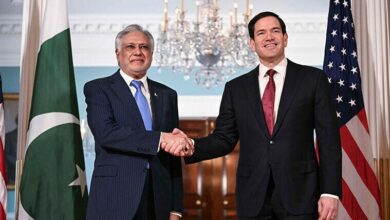Petroleum dealers go on strike against advance tax
- Knowledge is power
- The Future Of Possible
- Hibs and Ross County fans on final
- Tip of the day: That man again
- Hibs and Ross County fans on final
- Spieth in danger of missing cut
LAHORE: (Web Desk) The majority of petrol stations across the country are closed today to register a protest against the imposition of 0.5 per cent advance tax on the sale of petroleum products in the budget 2024-25.
The strike is being observed by petroleum dealers on the call of the Pakistan Petroleum Dealers Association (PPDA).
The government’s committee, comprising senior officials of the Petroleum Division and the Federal Board of Revenue (FBR), had a meeting at the Petroleum Division last night to discuss the demands of the association.
Also read: Petroleum dealers call a nationwide strike on July 5 against advance tax
The committee, however, failed to make up its mind whether to accept the demands of petroleum dealers or reject them.
In a joint statement, the Petroleum Division and the Oil and Gas Regulatory Authority (Ogra) announced that the supply of petroleum products will be continued.
They also asked the oil marketing companies to ensure the sale of petroleum products across the country.
In Lahore, a partial strike was observed as not all petrol stations were closed in the city despite the call for a strike from the PPDA.
On Thursday, the PPDA announced a nationwide strike from July 5 (today) against the imposition of advance tax in the budget 2024-25.
The association announced the closure of petrol pumps across the country from 6:00 am on Thursday, stating the strike could last more than a day.
The association issued instructions to the petroleum dealers to keep petroleum products stocked at the filling stations till July 4.
Responding to the call, nearly 13,000 dealers across the country became ready to close their filling stations from the morning of July 5.
The PPDA chairman said there will be no negotiations until the government withdraws the tax.









